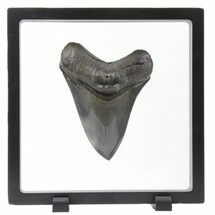This Specimen has been sold.
.26" Acheroraptor Tooth - Richardoestesia isosceles Morphological Characteristics
Acheroraptor temertyorum was described in 2013 from upper and lower jaw bones that contained teeth. The teeth have been known for decades, but no diagnostic material had been recovered. Acheroraptor lived in the Cretaceous period 67-66 million years ago and was relatively large for a raptor and surprisingly more closely resembled asian velociraptors than other North American Dromaeosaurs.
Smaller theropods like Velociraptor typically did not use their teeth for killing and so their teeth are much smaller in size in relation to their skulls when compared to larger therapods that used their teeth as the primary killing tool.
Acheroraptor teeth are like tiny, slightly curved daggers with rounded serrations with the posterior serrations being larger than the anterior. The most distinguishing feature are apicobasal ridges, ridges running from the base of the tooth to the apex.
Many of the raptor teeth found in the Hell Creek Formation show morphological differences that are often attributed to taxon from other formations of different ages. Among those are Saurornitholestes, Richardoestesia gilmorei, Richardoestesia isosceles, and Paronychodon. Remains of all of these species are fragmentary and some known only from teeth and there is no evidence they lived in the Hell Creek Formation.
The 2013 study found that Acheroraptor was the only dromaeosaurid from the Hell Creek Formation and concluded that dromaeosaurid teeth that had been attributed to other taxa should be identified as Acheroraptor. Any other identification is not supported scientifically until associated skeletal remains are found to indicate otherwise.
This tooth in particular shows morphology similar to that of Richardoestesia isosceles. The tooth is tall with an isosceles triangle shape. It is .26" long with beautiful enamel and some feeding wear that has dulled the serrations. It comes in an acrylic display case.
Smaller theropods like Velociraptor typically did not use their teeth for killing and so their teeth are much smaller in size in relation to their skulls when compared to larger therapods that used their teeth as the primary killing tool.
Acheroraptor teeth are like tiny, slightly curved daggers with rounded serrations with the posterior serrations being larger than the anterior. The most distinguishing feature are apicobasal ridges, ridges running from the base of the tooth to the apex.
Many of the raptor teeth found in the Hell Creek Formation show morphological differences that are often attributed to taxon from other formations of different ages. Among those are Saurornitholestes, Richardoestesia gilmorei, Richardoestesia isosceles, and Paronychodon. Remains of all of these species are fragmentary and some known only from teeth and there is no evidence they lived in the Hell Creek Formation.
The 2013 study found that Acheroraptor was the only dromaeosaurid from the Hell Creek Formation and concluded that dromaeosaurid teeth that had been attributed to other taxa should be identified as Acheroraptor. Any other identification is not supported scientifically until associated skeletal remains are found to indicate otherwise.
This tooth in particular shows morphology similar to that of Richardoestesia isosceles. The tooth is tall with an isosceles triangle shape. It is .26" long with beautiful enamel and some feeding wear that has dulled the serrations. It comes in an acrylic display case.
SPECIES
Acheroraptor temertyorum
LOCATION
Powder River County, Montana
FORMATION
Hell Creek Formation
SIZE
.26" long (straightline)
CATEGORY
SUB CATEGORY
ITEM
#12285
We guarantee the authenticity of all of our specimens.
 Reviews
Reviews












